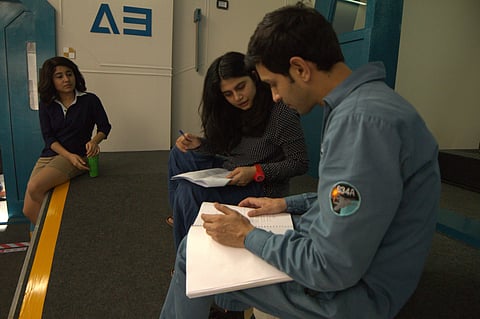

To classify Arati Kadav as merely a filmmaker would be to do her a disservice. Having shot to social media fame after her sci-fi film Cargo premiered on Netflix recently, it is easy to overlook the fact that there's so much more to her. An engineer, a storyteller, someone who worked as a techie, uprooted herself midway and took the plunge, a TED speaker, honestly there's a lot to discover and that's what happened when we spoke to Arati.
Experts:
Coming from an engineering background and having worked with software giants like Microsoft, when did you realise that movies were your calling?
I have been excited about storytelling from when I was young and it is one of my favourite hobbies. Coming from a middle-class family, there was a lot of focus and importance to academics, I studied engineering and went to work with bigger corporate companies. At this phase, I not only achieved financial independence but developed my perspective of looking towards life. Since I always wanted to tell a story, I gifted myself a video camera and from then, I started shooting tiny videos. I started telling stories through videos or what we call a cinematic medium. I liked it so much that I finally decided to pursue film making rather than just shooting tiny videos. The art and craft of filmmaking is evolved but most of us tend to trivialise it.
When you quit your job, you decided to study filmmaking. Why?
I applied in many institutes both in India and abroad but was selected to study at Whistling Woods International because I wanted to learn making movies in the Indian context more than the foreign context. And I wanted to do a course of shorter duration than a long duration. Hence, I took a sabbatical in 2010 from my usual job as a software engineer and went on to pursue a Film Direction Course for two years. Quitting a well paid job that gave me all the comforts of life, including foreign holidays, was not easy but if we need to gain something good in life, we need to lose something too. When I told my friends and my father about pursuing my dream in filmmaking, they were shocked and did not take my words seriously. In fact, my father made me write an email saying that I am responsible for my own decision and I am serious about it. He replied also saying that this email is a document saying that he advised me before joining the film industry. He was very upset about my decision of re-establishing myself in a new career.
Can you tell us about your experience in making films as a beginner?
I think sometimes we misunderstand our competencies before we go to another field. But some factors like hard work, commitment and discipline help you achieve whatever you dream of. In my case, I lacked artistic exposure and when I was exposed to colour theory and film shots, I felt like a storm had hit me. While I was enjoying the process, I was having a sense of fear looking at the peers who were not as old as me and had a good exposure towards art, acting and photography. The first few months of the course were a real struggle but I took it as an opportunity to learn and bridge the gap.
What inspired you to write and direct an Indian original science fiction film like Cargo?
Being an engineer, I was always fascinated with science fiction, the universe around us and so on. This is not the first time I have directed a science fiction film. The short films that I made earlier were also in the same genre. I made a 40-minute short film called Time Machine, which is a romantic science fiction story that deals with love, childhood and growing up. It was something that I have always felt that I can do better than others as far as science fiction is concerned. I also made sure that the science fiction movie I made was very Indian and that people here must connect with it and it must look different from all the typical Hollywood sci-fi movies that people watch.
How were you able to convince people to invest in a science fiction film, especially when it was your debut movie?
Most of the people who produced my film were my good friends and I have worked with them for a long time on various other projects. They knew that I have come a long way so when I asked their help for the movie, it was not just monetary help. They helped me in all the ways that they could.
You told us that your father made you write an email about the decision you made a few years ago. Now your film Cargo is being appreciated by many people, how is his reaction?
My father has been very happy to see me progress in the film industry. In fact, every morning when he wakes up, he plays this movie and tells me that it is made differently. I didn't do it for the sake of doing the film but I imagined every single factor like the spaceship, the characters and other factors in this movie.
You have been reading science fiction and listening to podcasts for a long time. Can you recommend some of these shows and books for kids?
I mostly read books written by Ted Chiang and a few other authors. And the one podcast that I love to listen to is Our Opinions Are Correct. It is a podcast run by famous science journalist Annalee Newitz and another science fiction writer called Charlie Jane Anders.
